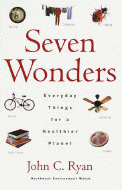go to WASHINGTON FREE PRESS HOME (subscribe, contacts, archives, latest, etc.)
Jan/Feb 2000 issue (#43)
|
|
After a 10-year struggle, residents of Haller Lake have won their fight to shut down Northwest Hospital's medical waste incinerator. Burning medical wastes is one of the main sources of dioxin and mercury emissions, which "build up in the environment, the food chain, and our bodies and can cause health problems at extremely low concentrations," according to Alternatives, a publication of the Washington Toxics Coalition. Alternatives also ran a story about Ironite, a common lawn fertilizer containing toxics that accumulate in the soil with every application. The level of hazardous wastes on home lawns can become "equivalent to those in hazardous waste sites." Subscriptions to this important quarterly are $25: Washington Toxics Coalition, 4649 Sunnyside Ave. N., Suite 540 East, Seattle, 98103, 206-632-1545.
The latest issue of Everybody's Backyard, a national quarterly publication covering struggles for environmental justice, showcased activists in a largely African-American community in Detroit fighting to shut down Henry Ford Hospital's incinerator. Hospitals in Detroit's suburbs send their wastes to an autoclave in Ohio, while Henry Ford hospital burns the wastes onsite. Surveys show the community suffers black smoke, odors, higher rates of cancer, triple the asthma rates of the surrounding communities, and low birth weights. The latest issue of EBY also covers the 20-year struggle to get General Electric to clear its PCBs out of the Hudson River in New York, which according to EBY is considered the most contaminated river in the country. Subscriptions: $30 to Center for Health, Environment and Justice, POB 6806, Falls Church, VA 22040; cchw@essential.org; 703-237-2249.
Sandwiches and leftovers wrapped in plastic wrap may stay fresh, but they may also be getting a blast of toxins. Coop America Quarterly cites a Consumer's Union study showing that cheese wrapped in PVC (polyvinylchloride) plastic wrap contained the plasticizer DEHA at 153 ppm. The "safe" limit is 18 ppm for food migration. Production and incineration of PVC plastic produces the carcinogen dioxin, and when it is thrown "away" (environmentalists point out there is no such thing as "away") it will not biodegrade. The best policy toward plastic wrap might be the one advocated by antinuclear and environmental activist Dr. Helen Caldicott. "Never use it!" she has said. Coop America works for a just and sustainable society. To subscribe, send $25 to 1612 K St. NW, #600, Washington, DC 20006; www.coopamerica.org
The fossil fuel industry has stepped back from its often-stated claims that there is no global warming, according to the Multinational Monitor. Now the purveyors of coal, oil, and gas have switched from their "junk science" to "junk economics." To squash talk of fuel conservation and jumpstarting clean-fuel programs, they now claim that the greatest threat to the developing countries is poverty, and to overcome it, fossil fuels must be consumed. Activists point out that wind and solar power can be cheap and efficient with the right government and international assistance. (For a subscription to Multinational Monitor, send $25 to Essential Information, Inc., 1530 P St. NW, Washington DC 20005; monitor@essential.org.)
Between 1994 and 1998, 78,765 snowmobilers plowed through the Yellowstone and Grand Teton National parks. They left air pollution, noise, disturbance of wildlife, and gasoline runoff on sensitive land and water habitats. Snowmobiles pour out more pollution "in a single weekend than automobiles emit in Yellowstone in an entire year," says a coalition of nearly 20 national organizations aiming to drive the snowmobiles out of most areas of national parks. The groups have devised a Citizens' Solution for Winter Access to Yellowstone, which calls for reducing the number of vehicles, but not visitors, to the parks by 90%. Contact Clifford Hawkes, National Park Service, Denver Service Center, 12795 W. Alameda Pkwy, Lakewood, CO 80228; or e-mail yell_winter_use@nps.gov; or phone 307-344-2500 to support the Citizens' Solution.


Northwest Environment Watch, the independent research center that charts trends that degrade the environment, and suggests alternatives, has published Seven Wonders: Everyday Things for a Healthier Planet. The "everyday wonders" are earth-friendly ways of doing things. Author John C. Ryan says these are: bikes instead of cars; books borrowed from the library rather than purchased; pad Thai, a vegetarian dish; clotheslines instead of dryers; ladybugs instead of pesticides; ceiling fans rather than air conditioners; and condoms. While the "everyday wonders" may seem obvious, the discussions of the repercussions of everyone using the wasteful alternatives is fascinating and fact-filled. It can be ordered online for $12.95 from www.sierraclub.org or www.atrandom.com.
--Renee Kjartan